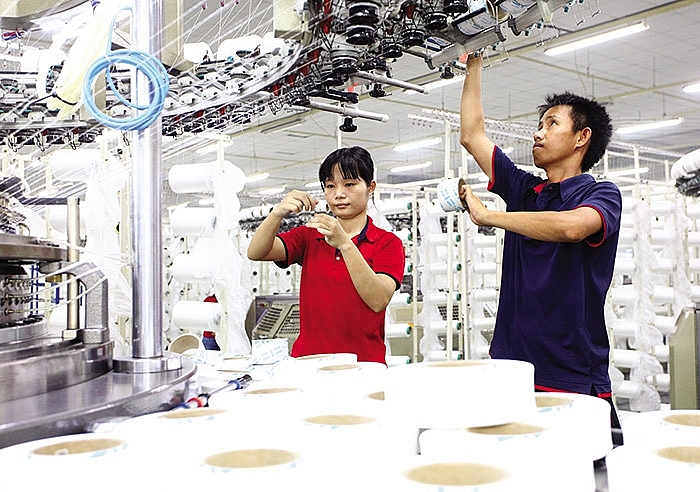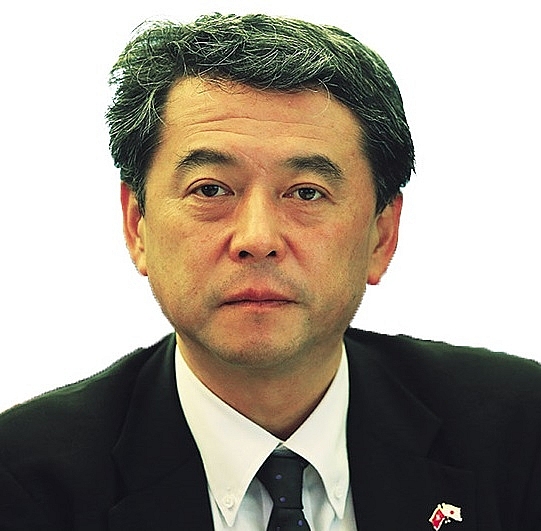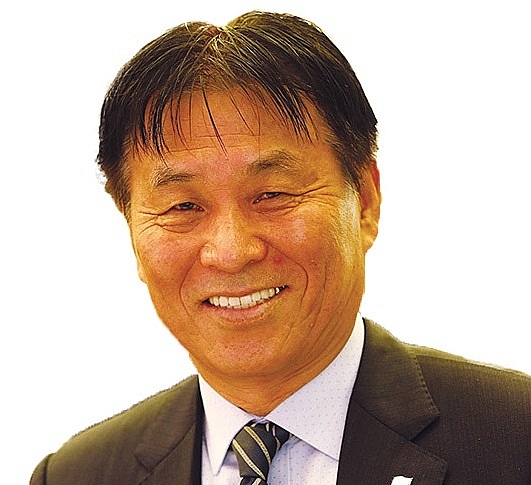New overseas policies ignite fresh FDI wave
 |
| Neighbours South Korea, Japan and Singapore, along with the US, remain Vietnam’s biggest foreign investors Photo: Le Toan |
Just a few days ago Travelport, a tech company on the New York Stock Exchange providing solutions for the travel and tourism industry, worked with the Vietnamese Ministry of Transport (MoT) on business opportunities for its global distribution system (GDS) in the sector.
“Having a presence in Vietnam for 16 years, Travelport sees huge business potential in not only tourism but also other areas. Thus we are planning to expand operations to other sectors in Vietnam, including in transport,” said Martin Herbert, managing director in Asia for Travelport.
Being one of the world’s leading GDS providers, Travelport’s new move is in line with growing demands for technology applications in the tourism and aviation industries to increase competitiveness in the digital age.
New policies to the south
Travelport’s step is in line with the US government’s recent announcement of the US-ASEAN Smart Cities Partnership, which aims to offer opportunities for US tech companies to develop key urban digital infrastructure in one of the world’s fastest-growing markets.
“This new effort, which includes Danang, Hanoi and Ho Chi Minh City, will seek ways that American companies can help combat growing urban challenges ranging from traffic congestion, water and air quality, to digital security. Our members will be deeply involved in this effort,” said Michael Kelly, chairman of the American Chamber of Commerce in Vietnam (AmCham), which represents the voice of hundreds of US firms in Vietnam.
Market opportunities for digital urban infrastructure and growing demand for digital tools make Southeast Asian cities a promising market for US technology companies. Other American tech giants have, too, been seizing the immense market opportunities that the ASEAN and Vietnam offer. Notably, Amazon has announced that it will partner with the Vietnam E-commerce Association to penetrate Vietnam’s e-commerce marketplace, which is projected to reach a value of $20 billion in 2020.
Industry insiders said that the US-ASEAN Smart Cities Partnership signals recognition of the importance of Southeast Asia amid the trade war with China. In absence of US participation in the Comprehensive and Progressive Agreement for Trans-Pacific Partnership (CPTPP), the partnership represents a significant opportunity for the US to bolster its presence and engagement in the region, and will allow the country to participate in setting information and communications technology norms and standards in Southeast Asia, including Vietnam.
In similar moves, Japan and South Korea are promoting their new investment strategies into Vietnam. They are focussed on advanced technologies of Industry 4.0 in alignment with Vietnam’s latest move to prioritise hi-tech and new technologies in its foreign direct investment (FDI) attraction by 2030, to stimulate inclusive socio-economic development.
South Korea is promoting President Moon Jae-in’s New Southern Policy (NSP) in a move to form an axis of prosperity in Asia through linking the northern and southern regions amid the trade stand-off between China and the US.
Under the NSP, Vietnam will be among the business and investment targets in the ASEAN region. The NSP encourages investment in smart/ICT, transport infrastructure, water sources management, and renewable energy in the country.
Thus far, Moon Jae-in’s administration has announced various policy measures to promote investment in these sectors within Vietnam, such as expanding the size of the Global Infrastructure Fund, ASEAN-ROK Cooperation Fund, and Korea-Mekong Cooperation Fund.
South Korean investors in Vietnam have been making moves in line with the new NSP, with outstanding names including Hanwha Aero Engines, Samsung, LG Display, Lotte, and others.
In a way to promote transnational trade co-operation and to ensure the market for Japanese enterprises, the Japan External Trade Organization (JETRO) is piloting 18 projects in the ASEAN, including in Vietnam, focussing on digital technology, healthcare, the Internet of Things (IoT) and services through “the Pilot Project for Nurturing New Industries between ASEAN and Japan”.
According to Tomofumi Abe, director of projects at JETRO, these ventures could potentially be extended to Vietnam because of similarities in manufacturing and society, along with other factors.
“Smart logistics, healthcare, and other services related to manufacturing are indeed not new sectors to Japanese firms. Now they utilise IoT and hi-tech to increase the quality and efficiency of their products,” Abe told VIR.
NTT Data, TBA and Toppan Forms are the prestigious Japanese companies contracted by JETRO to carry out the three pilot projects in smart card use, the time of goods in transit in the ASEAN, and genetic testing kits in Vietnam amid growing local demands in the field.
In particular, NTT Data plans to expand B2B TradeCloud service to ASEAN members’ private companies and customs for the region’s trade facilitation and economic growth, while TBA is planning to work with Vietnamese partner Mebipahr to assemble the mosquito-borne viruses 3 Kit and expand the technology to other application development in Vietnam. Toppan Forms, which already has offices in Vietnam, also has a plan to expand its cashless payment service in the country.
Hitachi High-tech, which piloted a shared smart factory as a service in Thailand, is going to expand to other ASEAN countries, with Vietnam, Myanmar and Cambodia being the primary targets, while Internet Initiative Japan is intending to harness the power of IoT in aquaculture, specifically shrimp in Vietnam.
With these new policies to Southeast Asia, Vietnam is expected to see a new wave of foreign investment in advanced technology of the Fourth Industrial Revolution, especially when landmark free trade agreements (FTAs) take effect.
Experts said that Vietnam already has advantages, and the key issue is how the country solves investors’ concerns to add to its attraction.
Hallmarks in 2018 FDI attraction
According to statistics from the Ministry of Planning and Investment (MPI), Vietnam attracted nearly $35.47 billion worth of total newly-registered, added FDI and state acquisitions in 2018, slightly down 1.2 per cent on-year.
Japan, South Korea, Singapore and the US remain the country’s biggest FDI investors, while processing and manufacturing, realty, retail and sci-tech receive the most attention. The cities of Hanoi, Ho Chi Minh City and Haiphong, and Binh Duong province are the most attractive investment locations.
Despite a slight fall, there were some highlights in FDI attraction in 2018. In particular, there is an increase in FDI in sci-tech, reflecting an obvious trend among tech companies. As shown in MPI statistics, sci-tech had the fourth-most attention among foreign investors in 2018, an improvement from ranking 7th in 2017.
In particular, foreign-invested enterprises (FIEs) funded a total of $2.15 billion in 386 new sci-tech projects in the year to December 20, just behind processing and manufacturing, realty and retail. Of the sum, $183.37 million is newly-registered capital and $144.05 million is added capital.
Stake acquisition was the other highlight in the FDI picture in 2018, when it saw a surge of nearly 60 per cent on-year in value and nearly 30 per cent in numbers of transactions.
Remarkably, Vietnam also witnessed improvements in FDI disbursement with $19.1 billion being disbursed during the 12-month period, up 9.1 per cent on-year, making it a new record. In 2017, FDI disbursement set a record when $17.5 billion was disbursed, reflecting the improvement in FDI quality.
Business groups in Vietnam, including the chambers of commerce from Europe, South Korea, Japan, and the US, along with the Singapore Business Association, said that their members remain optimistic about business prospects in Vietnam, and that they will continue to make long-term business and investment activities in the country.
| Marko Walde, Chief representative, German Industry and Commerce Vietnam
The German Industry and Commerce Vietnam expresses our support for the signing and ratification of a free trade agreement (FTA) between the EU and Vietnam. In October 2018, our federal government also announced an agreement in implementing the ambitious plan of the EU: the ratification of the EU-Vietnam FTA (EVFTA) by the end of 2018. The federal government stated that the EVFTA should be given high priority. This agreement underscores the fast growth of the ASEAN region as well as Vietnam. The EVFTA will bring customs facilitation, information exchange on custom requirements, investment in the modernisation and simplification of customs procedures, and ensuring the transparency of all custom requirements. This agreement will also create new market access opportunities across a range of sectors, covering goods, services, and investment. Therefore, European and German trade will benefit in multiple ways. Moreover, EU and German companies can enjoy investment protection with trade facilitation and increase investments in Vietnam. Therefore, local production will be improved with more variety of designs as well as better quality. EU and German investors would bring their well-known technology in management and training, allow more value-added production, and reduce waste of material and resources. In addition, EU and German investors would create domestic jobs that in turn drive consumer spending in Vietnam. Germany is the most important trade partner in the EU, and once in force, the agreement will provide opportunities to increase trade and support jobs and growth on both sides. We see challenges for Vietnamese products in terms of IPR protection, global competitiveness, and the origin of the products’ materials. The German Industry and Commerce Vietnam is pleased to accompany Vietnamese and German businesses on the path of implementation of FTAs, in which we support Vietnamese businesses in better understanding these agreements, in improving their products and services, as well as in educating their workforce and in networking with potential German partners for know-how and technology exchange. Tetsu Funayama, Representative, Japan Chamber of Commerce and Industry
Infrastructure is important to attract foreign investors. As we know, Vietnam’s public debt ceiling is nearly 50 per cent of GDP. The Vietnamese government is tightening control over loans. In this context, developing infrastructure under the public-private partnership (PPP) format is an effective tool for Vietnam. However, there are some problems in the existing legal documents related to PPP that need to be further improved. We propose the government to allow investors and project developers to mortgage land-related assets to facilitate them in raising funding for their projects. The Vietnamese government should bear certain part of the risks in foreign exchange and provide government guarantees for certain projects. According to a recent survey by the Japan Bank for International Co-operation, Vietnam is a promising investment destination to Japanese investors in Southeast Asia. However, one of their concerns when they invest in a new market is the development of supporting industries. The Vietnamese government should consider policies to develop supporting industries in some key sectors, creating favourable conditions for Japanese investors who have strong expertise in the field. Vietnam needs to have tax incentives and financial support for foreign investors in the sector. Kim Han Yong, Chairman, Korea Chamber of Business in Vietnam
In the past, FDI in Vietnam focused mainly on real estate, infrastructure, and manufacturing for exports. Looking towards the next 30 years, Vietnam should pay attention to improving its business climate, while upskilling labour force to meet the growing demand for sci-tech manpower. In fact, technology transfer between foreign investors and Vietnamese partners is yet to meet expectations due to the lack of skilled workforce. The business environment and tax incentives are not enough. Vietnam needs to have more friendly policies for foreign investors. Administrative procedures for investment in IT infrastructure should be further simplified. Another concern is the changing legal framework. The country should improve the implementation of laws so as to ease difficulties for businesses when a new law comes into effect. Many foreign investors left China because of this very reason. It is expected that the investment shift from China will continue in the future and how attractive Vietnam is depends on the country’s future policies. KHOON GOH, Head of Asia Research, ANZ
In ratifying the CPTPP, Vietnam has committed to initiating extensive reforms covering everything from competition and trade to intellectual property, and market access for goods. While timely, such reforms are crucial for facilitating gains in its absorptive capacity. The country is expected to be the biggest recipient of FDI flows in the region as it is poised to benefit from relocation in production as the result of the US-China trade tensions. Manufacturing, as said, will account for the lion’s share of the incoming FDI. FDI flows in construction and real estate services have increased in 2018 amid buoyancy in the sector. In addition to traditional greenfield FDI, the divestment of state-owned enterprises has increased and is forecast to increase foreign investor interest in the Vietnamese equity market. The outlook for FDI remains positive. Surveys suggest that around a third of foreign companies in China have shifted or are considering shifting some production in light of US-China trade tensions. We recently argued that the US-China trade war will further catalyse the incremental diversification of manufacturing out of China. Even if associated tensions de-escalate, further reorganisation of regional supply chains are imminent as businesses ringfence their production and exports against any future tariff measures. We have identified Vietnam as being best placed in Southeast Asia to reap the benefit of this development. The CPTPP will also boost Vietnam’s investment attractiveness. Stefano Clini, Managing director, Carlsberg Vietnam
Carlsberg Vietnam strongly supports the EVFTA, which will open a new era full of partnership opportunities and set the highest standards of labour, safety, as well as environmental and consumer protection in Vietnam. Sustainable growth has always been at the core of our business, both globally and in Vietnam, and with the EVFTA in force, we can look forward to more favourable conditions to accelerate our progress in achieving Carlsberg’s sustainability ambitions and targets. More than two decades ago, we were the first large Danish multinational to enter Vietnam. Now, Vietnam has grown to be one of the key markets for Carlsberg Group. We have high hopes that this agreement will help position Carlsberg Vietnam for further robust growth and more opportunities to deliver the highest quality beverage with Carlsberg’s 170-year history of perfecting the art of brewing. Satoru Wachi , Deputy general director, Thang Long Vinh Phuc Industrial Park Co., Ltd.
Since 2012, when we were seeking for a location for our third industrial park (IP) project in Vietnam, we have received great support from Vinh Phuc authorities. However, the capacity of the local Industrial Park Management Board remains limited when it comes to licensing or the management of construction works and environment for businesses in local IPs, while licensing and management competences of different agencies overlap. We expect administrative procedures to be further simplified to facilitate business activities. Looking forward, the EVFTA and the CPTPP will bring in huge opportunities for Vietnam. We are planning to expand in Vietnam with a fourth and a fifth IP in the country. We are still studying the potential locations. |
What the stars mean:
★ Poor ★ ★ Promising ★★★ Good ★★★★ Very good ★★★★★ Exceptional
Themes: EVFTA & EVIPA
Related Contents
Latest News
More News
- VNPAY and NAPAS deepen cooperation on digital payments (February 11, 2026 | 18:21)
- Vietnam financial markets on the rise amid tailwinds (February 11, 2026 | 11:41)
- New tax incentives to benefit startups and SMEs (February 09, 2026 | 17:27)
- VIFC launches aviation finance hub to tap regional market growth (February 06, 2026 | 13:27)
- Vietnam records solid FDI performance in January (February 05, 2026 | 17:11)
- Manufacturing growth remains solid in early 2026 (February 02, 2026 | 15:28)
- EU and Vietnam elevate relations to a comprehensive strategic partnership (January 29, 2026 | 15:22)
- Vietnam to lead trade growth in ASEAN (January 29, 2026 | 15:08)
- Japanese business outlook in Vietnam turns more optimistic (January 28, 2026 | 09:54)
- Foreign leaders extend congratulations to Party General Secretary To Lam (January 25, 2026 | 10:01)







 Tag:
Tag:




















 Mobile Version
Mobile Version